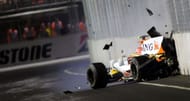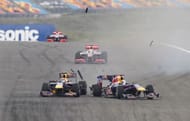"You need to let Lewis by into turn 13 this lap". This message to Valtteri Bottas from the team to allow Lewis Hamilton to win the Sochi Grand Prix has brought to the forefront once again the debate on team orders. Should team orders be banned? Before I delve into this question let's look at the history of team orders and how it has evolved over time.
While most people believe that team orders are traced back to the Silverstone Grand Prix in '55, the first instance of team orders was in the French GP back in '51 when Alfa Romeo made Fangio and Fagioli swap cars when Fangio's car was facing multiple problems. Fagioli was livid after the race and immediately quit Alfa Romeo.
The first time team orders to not attack a teammate were given in the 1955 Silverstone Grand Prix where Fangio was asked to let Stirling Moss, his teammate, win his home Grand Prix. Fangio obliged and did not attack his teammate during the final few laps of the race.
The most influential team orders probably came in the '64 Mexican Grand Prix which saw Lorenzo Bandini allow John Surtees to overtake him which led to Surtees securing enough points to ensure that he won the World Championship that season. In 1979 Williams instructed Regazzoni to not attack Alan Jones despite him being ahead in the Championship as a result of Jones being their No 1 driver that season.
In '91 Ayrton Senna, who had already sealed the Championship, allowed his teammate to pass him in the Japanese Grand Prix. In '97 in order to benefit Michael Schumacher his teammate Eddie Irvine was made to start with low fuel so that he could hold up the Willams cars at the front.
In 1998, in the Belgian Grand Prix, Jordan found itself with a 1-2 as a result of David Coulthard crashing into Michael. Ralph was given team orders to not overtake and to hold his position much to the displeasure of Michael which led to a feud between him and the Jordan management.
In 2002 Rubens Barrichello was given orders to let Michael pass in the final lap of the Austrian Grand Prix. This was a move that attracted a great deal of negative publicity and Ferrari were dragged through the mud by fans and the Media.
After the season the FIA banned team orders that could influence the outcome of the race. However, this rule continued to be circumvented in a plethora of ingenious ways. In 2010 Felipe Massa was told that his teammate was much faster than him and he slowed down and allowed Sebastian Vettel to overtake him.
In the 2008 Singapore Grand Prix, one of the most blatant misuses of team orders took place when Renault ordered Nelson Piquet Jr to deliberately crash in Lap 14 in order to bring out the Safety Car so that Alonso who was starting at 15th would benefit from the same. The infamous incident, also known as crashgate, is another example of how team orders continued to spoil this sport.
In 2010 the FIA removed the ban on team orders since they felt that it was not really working. In 2012 Ferrari broke the FIA seal on Massa's gearbox which ensured that he got a 5-place grid penalty in the US Grand Prix which made him and Alonso start on the clean side of the circuit.

However, there have also been multiple instances where drivers have refused to follow team orders which have led to falling out between the team and the driver. In 1981 Carlos Reutemann in the Brazilian Grand Prix refused to give up his position to teammate Alan Jones which led to a huge feud between the two of them, resulting in Alan Jones retiring at the end of the year.
Similarly in 1982 Rene Arnoux refused to give up his position to Alain Prost in the French Grand Prix much to the outrage of Renault. In 2010 when Mark Webber was told that Sebastian Vettel was faster than him, he refused to slow down and it resulted in the two Red Bulls colliding.
In 2013 Malaysian Grand Prix Sebastian was given a Multi 21 order which meant that he was supposed to let Webber through but he refused to do so. This led to a huge controversy.

It can clearly be seen that team orders date way back. Coming back to the original question of whether team orders should be banned, the answer, in my opinion, is yes. This is simply because it is against the very spirit of racing and Formula 1.
Any person who has ever won a race, or worse, a Championship as a result of team orders is simply not a true champion. The reason why people watch F1 is primarily to watch some good racing and if a certain driver is unable to overtake his teammate on his own he clearly does not deserve to win the Championship.
We have seen how drivers also do not want to win this way and the same has been reflected by champions such as Schumacher who refused to stand on the No 1 step of the podium after the incident in Austria. Even Lewis Hamilton made Valtteri Bottas stand up on the podium along with him and his press conference shows that he did not want to win the race this way.
Suppose he ends up winning the title this year by a margin of six points, his Championship will be discredited as people will come out and say that he won only because of team orders. Hamilton understands how frustrating team orders are as he has been on the other end as well when he was teamed up with Alonso in McLaren back in 2007.
While one can understand that the team wants to secure maximum points and have a better chance at winning the Championship, the entire spirit of racing is lost and it is disrespectful to the sport and the fans when they use team orders to achieve the same.
Therefore, the FIA must once again ban it and impose higher penalties. In case team orders are found to have been given, the drivers must be disqualified from the race and penalty points must be awarded to them and the team. Drivers themselves would be dissuaded from giving in to team orders. Therefore if the ugly side of F1 is to be removed team orders must necessarily be banned.
